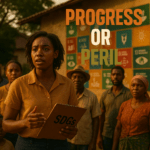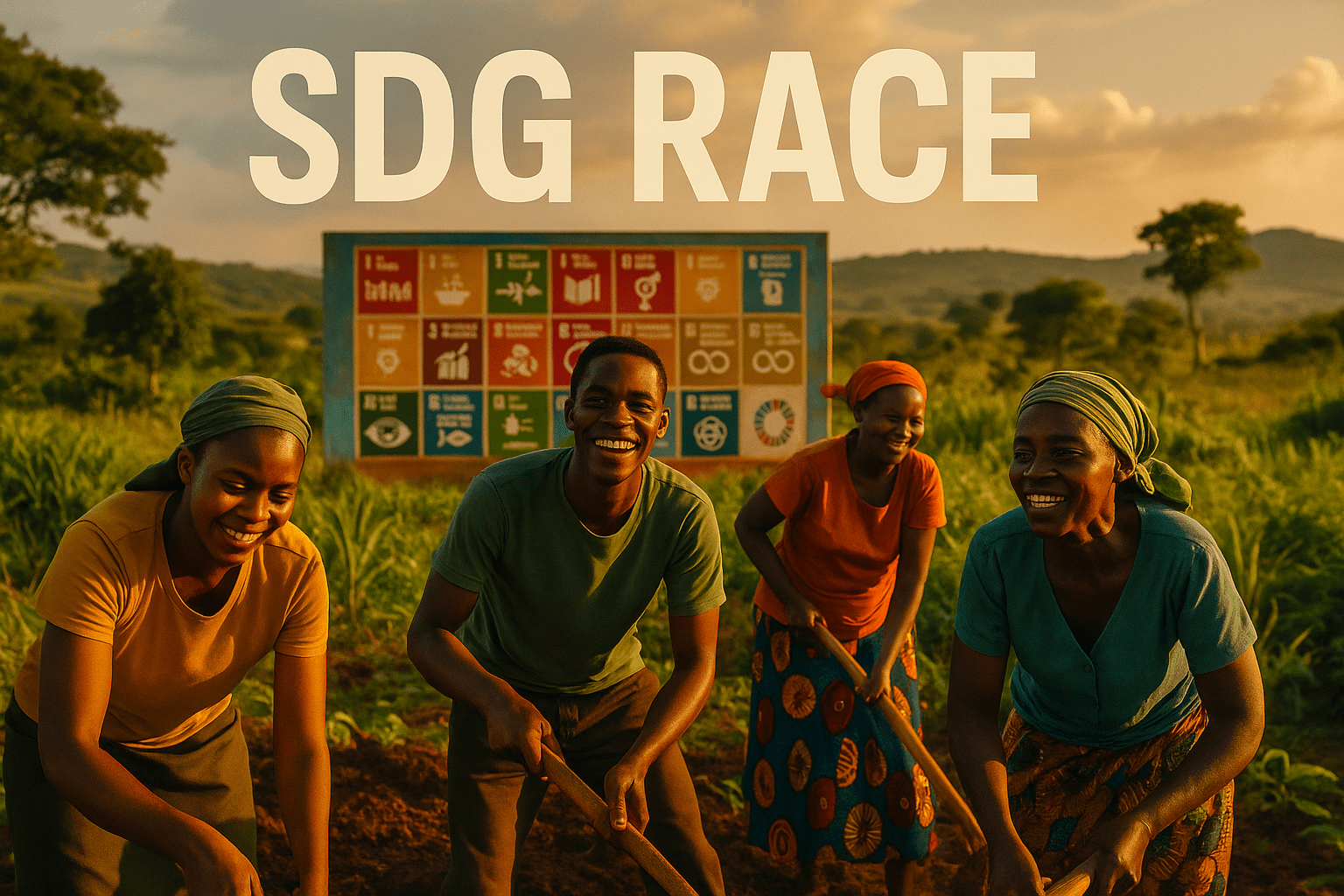

Africa's SDG Race: Can We Make It?
By Darius Spearman (africanelements)
Support African Elements at patreon.com/africanelements and hear recent news in a single playlist. Additionally, you can gain early access to ad-free video content.
Africa's SDG Progress: A Critical Look
Africa is making strides toward achieving the Sustainable Development Goals (SDGs), showing progress on more than two-thirds of these global targets. However, the pace of this progress is simply too slow to meet the ambitious 2030 deadline (undp.org). This slow movement is particularly noticeable in vital areas such as decent employment, gender equality, and access to social protection. The 2024 Africa Sustainable Development Report (ASDR) highlights this urgent situation, emphasizing that less than six percent of the 32 measurable SDG targets are on track to be achieved by 2030 across the continent (undp.org).
Furthermore, of the remaining measurable targets, 21 require significant acceleration to be achieved, and negative trends for eight targets must be reversed (undp.org). The 2023 Africa Sustainable Development Report previously called for accelerated efforts to ensure Africa reaches these global goals by the 2030 deadline (undp.org). The Sustainable Development Goals (SDGs) are a collection of 17 interconnected global goals. They serve as a blueprint for creating a better and more sustainable future for everyone. The United Nations General Assembly established them in 2015, with the aim of achieving them by 2030. Their purpose is to tackle global challenges such as poverty, inequality, climate change, environmental degradation, and to promote peace and justice.
Africa's SDG Progress Status (2024)
Financing the Future: Bridging the Gap
A significant obstacle to achieving the SDGs in Africa is the lack of adequate financing. The continent faces an annual sustainable development financing gap of up to USD 762 billion (afdb.org). This gap represents the difference between the financial resources needed to achieve the SDGs and the funds currently available. It is estimated to be $4 trillion for Africa (brookings.edu). The 2024 Africa Sustainable Development Report emphasizes the critical importance of scaled-up development financing (afdb.org).
For example, total annual climate finance flows to Africa from domestic and foreign sources amounted to just USD 29.5 billion in 2020. This figure is only 11% of the total need (sdg.iisd.org). Climate finance refers to local, national, or transnational funding from public, private, and alternative sources to support actions that address climate change. It is crucial for Africa because the continent is especially vulnerable to the impacts of climate change, and significant investment is required for adaptation, renewable energy, and resilient infrastructure. The report also highlights the necessity for a global financial architecture that includes increased access to finance and debt relief measures. This would ensure countries can invest in key areas like the just energy transition (undp.org). A just energy transition involves shifting from fossil fuel-based energy systems to renewable energy sources in a way that is fair and inclusive, addressing the social and economic impacts on workers and communities.
The Drain of Illicit Financial Flows
Illicit financial flows (IFFs) pose a significant impediment to financing critical agendas in Africa. These cross-border movements of money are illegally earned, transferred, or utilized. They originate from activities such as corruption, tax evasion, money laundering, and criminal activities. High illicit financial flows, totaling around $1.3 trillion in outflows and $1.1 trillion in inflows in 2020, continue to hinder the financing of key agendas (afdb.org). Africa is losing approximately $88.6 billion annually due to these illicit flows (afdb.org).
In 2019, Africa was losing USD 88.6 billion, or 3.7% of its gross domestic product (GDP), annually in illicit financial flows (sdg.iisd.org). These flows hinder SDG financing by depleting public resources that could otherwise be invested in essential public services like health, education, and infrastructure. They also reduce tax revenues, as tax evasion and avoidance shrink the tax base, limiting governments' ability to fund development programs. Furthermore, IFFs can exacerbate debt burdens, as countries may resort to external borrowing to compensate for lost revenues, making it harder to allocate funds to SDGs. They also undermine governance and institutions, as IFFs often involve corruption, which weakens public institutions and reduces their effectiveness in delivering development outcomes.
Illicit Financial Flows Impacting Africa (2020)
Data Gaps: A Blind Spot for Progress
Data gaps remain a significant challenge for tracking progress on the SDGs in Africa. These gaps prevent a full picture of the continent’s performance on SDGs (undp.org). The ASDR highlighted that key data gaps persist in many countries across the continent (afdb.org). Data gaps refer to the absence or inadequacy of reliable, timely, and disaggregated data across various indicators. These gaps exist due to several factors, including limited statistical capacity, insufficient funding for data collection, weak data infrastructure, and challenges in collecting data from informal sectors or remote areas.
This lack of data makes it difficult to accurately assess progress, identify areas needing intervention, and formulate effective policies. The report recommends including skills and capacity building in priorities to have a more accurate picture of countries' achievements and needs in terms of inclusive and sustainable development (afdb.org). Data limitations particularly inhibit performance tracking on good governance (SDG 16) (undp.org). Governance data is particularly challenging to track because it often involves qualitative aspects, sensitive political information, and relies on diverse sources. It is important because good governance is foundational to achieving all other SDGs. Without transparent, accountable, and inclusive institutions, efforts to reduce poverty, improve health, or protect the environment are severely hampered.
Accelerating Key SDGs
Africa needs to accelerate progress on specific SDGs to meet the 2030 targets. The findings of the 2024 Africa Sustainable Development Report highlight the need for Africa to accelerate progress on SDGs 1 (No Poverty), 2 (Zero Hunger), and 17 (Partnerships for the Goals) (undp.org). SDG 17 focuses on “Partnerships for the Goals,” emphasizing the need for global cooperation to achieve the SDGs. Its role is to mobilize and share knowledge, expertise, technology, and financial resources to support the achievement of the SDGs in all countries, particularly developing countries. The acceleration of SDG 17 is highlighted because many challenges, such as climate change, illicit financial flows, and global health crises, require collective action beyond national borders.
The report also emphasizes the need to reverse the negative trend on climate action (Goal 13) (undp.org). The negative trend in climate action (SDG 13) in Africa is caused by a combination of factors. These include high vulnerability to climate change impacts, limited financial resources for adaptation and mitigation, dependence on climate-sensitive sectors, inadequate access to climate finance, and capacity gaps. African countries are disproportionately affected by droughts, floods, and extreme weather events, despite contributing minimally to global emissions. Many African nations lack the funds to invest in climate-resilient infrastructure, renewable energy, and early warning systems. Economies often rely heavily on agriculture, which is highly susceptible to climate variability.
Beyond Financing: Other Barriers to Progress
Beyond financing and data gaps, several factors contribute to the slow pace of SDG progress in Africa. Governance challenges, such as weak institutions, corruption, and political instability, can hinder effective policy implementation and resource allocation. Conflict and insecurity also divert resources, displace populations, and disrupt development efforts. Inadequate infrastructure, particularly in energy, transport, and digital connectivity, limits economic growth and access to essential services. African economies are often highly susceptible to global economic downturns, commodity price fluctuations, and climate-related disasters, making them vulnerable to external shocks. Furthermore, gaps in education, health, and skills development contribute to limited human capital development, which constrains productivity and innovation.
These challenges are not uniform across the continent. SDG progress and financing gaps vary significantly among African countries and subregions. Factors such as economic stability, governance quality, resource endowments, and exposure to conflict contribute to these regional disparities. Some countries may be on track for certain goals, while others lag significantly across multiple indicators. For example, the continent struggles with low productivity, informality, and youth unemployment, emphasizing the need for inclusive job creation and economic transformation. Over 23 percent of African youth are not in education, employment, or training (NEET), with women disproportionately affected.
Youth Employment and Economic Indicators in Africa (2023)
Strategies for Acceleration
To address these challenges, concrete strategies and policies are recommended or already underway to accelerate SDG achievement in Africa. Strengthening domestic resource mobilization is crucial, which includes improving tax collection, curbing illicit financial flows, and optimizing public spending. Leveraging regional financial institutions is also vital, empowering African development banks to increase lending and innovate financial mechanisms. Promoting green growth, such as investing in green minerals and value addition, can create sustainable economic opportunities (undp.org).
Furthermore, African countries must prioritize efficiency enhancements in domestic development spending, ensuring that existing funds are used effectively for health and education (brookings.edu). Strategic investments, particularly in infrastructure, energy, and technology, require increased ingenuity and ambition. Improving governance, strengthening institutions, promoting transparency, and combating corruption are also essential. Fostering public-private partnerships can mobilize private sector investment for sustainable development. Exploring new revenue streams, such as carbon markets, can also help fund Africa’s development (ecofinagency.com). These comprehensive approaches are necessary to ensure Africa can meet its development goals and secure a more prosperous future for its people.
ABOUT THE AUTHOR
Darius Spearman has been a professor of Black Studies at San Diego City College since 2007. He is the author of several books, including Between The Color Lines: A History of African Americans on the California Frontier Through 1890. You can visit Darius online at africanelements.org.
